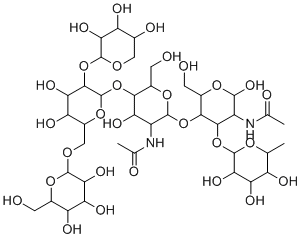Description
Bromelain, CAS 9001-00-7, is a complex mixture of proteolytic enzymes (protein-digesting enzymes) naturally found in the fruit, stem, and juice of the pineapple plant (Ananas comosus). While present in all parts of the pineapple, it is most commonly extracted from the pineapple stem. Bromelain is valued for its wide range of biological activities, including its ability to break down proteins, reduce inflammation, aid digestion, and support immune function. It is available in various grades and potencies, typically measured in units such as Gelatin Digesting Units (GDU) per gram or Milk Clotting Units (MCU). Its broad utility makes it a popular ingredient in dietary supplements, food processing, and cosmetic applications.
Properties
Property Value CAS Number 9001-00-7 EC Number 3.4.22.32 (stem bromelain); 3.4.22.33 (fruit bromelain) Source Pineapple plant (Ananas comosus), primarily from the stem Appearance Typically a light yellow to tan or off-white powder; can also be in liquid form Activity Units Commonly expressed in GDU/g (Gelatin Digesting Units/gram), MCU/mg (Milk Clotting Units/milligram), CDU/mg (Casein Digestion Units/milligram), FCC PU, Rorer units, etc. Optimal pH Generally active in a pH range of 4.0 – 8.0; optimal pH can vary depending on the substrate (e.g., pH 5.5-8.0) Optimal Temperature Generally active between 35∘C – 60∘C; optimal temperature around 50∘C – 60∘C (can vary) Solubility Soluble in water; insoluble in most organic solvents Molecular Weight Approximately 28,000 – 37,000 Da (major components) Stability Relatively stable; activity can be affected by prolonged exposure to high temperatures or extreme pH values. Usage
Bromelain’s diverse enzymatic activities lend it to a variety of applications:
- Dietary Supplements:
- Digestive Aid: Helps break down proteins, aiding in digestion and potentially reducing bloating or indigestion.
- Example: Included in digestive enzyme blend supplements.
- Anti-inflammatory Support: Widely used for its anti-inflammatory properties, potentially helping with conditions like sinusitis, arthritis, and sports injuries.
- Example: Oral supplements for joint health and reducing swelling.
- Immune Support: May help modulate immune responses.
- Food and Beverage Industry:
- Meat Tenderizer: Its proteolytic action breaks down tough meat fibers, making meat more tender.
- Example: Used in marinades or directly applied to meat before cooking.
- Beverage Clarification: Helps to remove protein haze in beer and other beverages, improving clarity.
- Example: Added during the brewing process to prevent chill-haze.
- Baking: Can improve dough handling and texture in baked goods.
- Pharmaceutical and Therapeutic Applications (often under medical supervision):
- Wound Debridement: Topical application can help remove dead tissue from burns and wounds, promoting healing.
- Example: Creams or ointments for burn treatment.
- Post-operative Swelling: May be used to reduce swelling, bruising, and pain after surgery or injury.
- Cosmetics and Personal Care:
- Exfoliation: Used in skincare products for its ability to gently exfoliate the skin by breaking down dead skin cells.
- Example: Facial cleansers, masks, and exfoliating scrubs.
Contact Us Now!
If you need MSDS,TDS or sample testing, please email us at pharm@sinocurechem.com or use the website live chat to get prompt reply.
- +86 13345119692
- +86 15550440621
- pharm@sinocurechem.com

